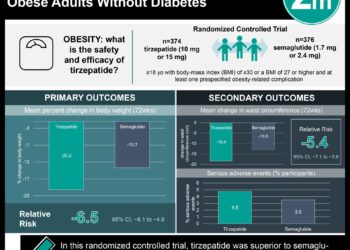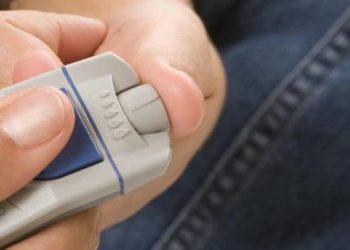Wellness Check: Nutrition
2 Minute Medicine is pleased to announce that we are launching Wellness Check, a new series dedicated to exploring new research evidence focused on wellness. Each week, we will report on articles examining different aspects of wellness, including (but not limited to) nutrition, sleep, reproductive health, substance use and mental health. This week, we explore the latest evidence-based updates in nutrition.
Smartphone-based intervention reduced body mass index and obesity in school children
1. Smartphone-based app effectively helped reduce obesity in school-aged children.
2. Family involvement is an important component of effectively reducing obesity using this smartphone-based app.
Evidence Rating Level: 1 (Excellent)
Childhood obesity is a growing health problem and multifaceted approaches that involve both children and their families are likely required to mitigate this growing epidemic. However, the effectiveness of smartphone-based interventions targeting students and their families in obesity prevention has not been tested, especially in middle-income countries like China.
This randomized control trial aimed to determine the effectiveness of a novel smartphone-based app that engaged students and families in preventing obesity in primary school children. This study followed 1362 children (51.5% boys), aged 8-10, from three socioeconomically distinct regions in China for one school year from September 11, 2018, to June 30, 2019. Twenty-four schools were included in the study with twelve schools randomized to intervention and twelve schools randomized to control. Boarding schools and schools for children with talents or minority ethnic groups were excluded. Intervention included a comprehensive smartphone-based app, ten classroom sessions on healthy habits, and frequent monitoring of physical activity and weight. The primary outcome was change in body mass index (BMI) and secondary outcomes included changes in adiposity, blood pressure, physical activity, and dietary behaviors.
The difference in BMI between intervention and control group after one year was -0.46kg/m2. Furthermore, the prevalence of obesity decreased by 27% in the intervention group compared to 5.6% in control group. However, this study was limited in that obesity-related behavior was reported by the students or their parents, which may be susceptible to a social desirability bias. Nonetheless, this study suggested that a comprehensive program that collectively engages children, teachers, and parents can be highly successful in reducing childhood obesity. Interestingly, previous studies targeting just children were less successful, suggesting the importance of involving parents. However, this study did not directly compare effectiveness of intervention targeting student alone versus student and parents, which may be a direction for future studies.
Soda tax is associated with decreased soda consumption in high school students
1. Taxing sweetened beverages resulted in decreased weekly consumption of soda in high school students.
2. Soda tax more significantly altered soda consumption in adolescents who were overweight or obese.
Evidence Rating Level: 1 (Excellent)
Soda is a main source of added sugars in a United States (US) diet and is heavily consumed by adolescents and young adults. Given the rise in obesity and type 2 diabetes in adolescents, strategies to decrease dietary sugar intake is necessary. However, whether the implementation of a tax on sweetened beverages can decrease soda consumption in adolescents is not well established.
This study aimed to assess if there is an association between the implementation of a tax on sweetened beverages with consumption of soda in high school students. Weekly soda intake was assessed in Philadelphia, Pennsylvania, US (a city with a sweetened beverage tax) and 7 comparison cities around the US without a beverage tax from September 2013 to December 2019. Biennial survey results were gathered from 86,928 high school students (49% female). The primary outcome was self-reported servings of sodas consumed per week.
After implementation of the soda tax on January 1, 2017, weekly soda consumption decreased by 1.5 servings per week in Philadelphia and only 0.6 servings per week in other cities during this same period. The difference-in-differences pre- and post-soda tax was significant in the overall population as well as in Hispanic/Latinx students, but not in Black or White students. Lastly, when stratified by weight, the difference-in-differences was not significant in normal weight students but was in obese or overweight students. However, this study was limited in the use of self-reported data and infrequent data acquisition. Nonetheless, the potential implication of this study may support future work that can examine the long-term effect of soda tax on outcomes most relevant to decreased soda consumption, such as rate of obesity of diabetes in adolescents.
Smelling and tasting milk alongside tube feeding does not improve weight in preterm infants
1. Smell and taste of milk with tube feeding did not change weight in preterm infants at time of discharge.
2. Smell and taste of milk may be associated with improved head circumference and length.
Evidence Rating Level: 1 (Excellent)
Supporting weight gain in infants born prematurely is clinically challenging. Preterm infants are often nutritionally supported by tube feeding due to poor milk tolerance. However, whether supplying smell and taste of milk alongside tube feeding can improve weight gain in preterm infants has not been extensively tested.
This randomized control trial was conducted at two different hospitals in Australia and tested the effect of exposing infants to the smell and taste of milk with tube feeding of milk. A total of 396 preterm infants (born <29 weeks postmenstrual age) with birth weight <1250g were randomized to receiving tube feeding with smell and taste of milk (196 infants) or just tube feeding (200 infants). Infants considered too sick to participate and those with congenital conditions that led to impaired growth or digestive dysfunction were excluded from the study. The primary outcome was weight z-score at discharge from hospital.
Compared to the control group, infants treated with smell and taste of milk did not have significantly improved weight z-score at discharge. However, treatment group infants had statistically significant better z-score for head circumference and length at 36 weeks postmenstrual age but not at discharge. However, this study was limited in that the group allocation was not concealed from care teams, participants, or researchers in both trials, which may have introduced a significant risk of bias. Nonetheless, even though inclusion of smell and taste of milk was not superior to just tube feeding in weight gain, this study was significant in suggesting there may have been still some benefits that deserve further study.
Image: PD
©2021 2 Minute Medicine, Inc. All rights reserved. No works may be reproduced without expressed written consent from 2 Minute Medicine, Inc. Inquire about licensing here. No article should be construed as medical advice and is not intended as such by the authors or by 2 Minute Medicine, Inc.







